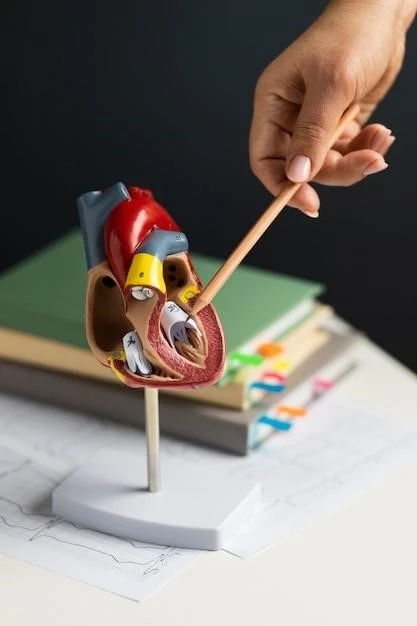Symptoms of Coarctation of Aorta
Recognize the symptoms⁚ Watch for high blood pressure, heart murmurs, headaches, and cold feet. Seek medical help if needed.
Recognizing the Symptoms
It is crucial to recognize the symptoms early⁚ Keep an eye out for signs like chest pain, dizziness, or difficulty breathing. Monitoring blood pressure regularly and seeking medical advice promptly can help in early detection and management. Remember, early intervention is key in treating coarctation of the aorta effectively.
Importance of Early Detection
Early detection is vital⁚ Timely diagnosis allows for prompt treatment and better outcomes. Regular check-ups, especially for infants and children, can aid in identifying coarctation of the aorta early on. Don’t delay seeking medical attention if you notice any concerning symptoms. Your health is a priority, so take action proactively!
Treatment Options for Coarctation of Aorta
Explore treatment options⁚ Surgical interventions or medication management may be recommended based on individual needs.
Surgical Interventions
Consider surgical options⁚ Procedures like aortic arch reconstruction or balloon angioplasty may be necessary for addressing coarctation of the aorta. Discuss with your healthcare provider to determine the most suitable surgical intervention based on your condition. It is essential to understand the risks and benefits involved in the surgical treatment process.
Medication Management
Understand medication options⁚ Medications like beta-blockers or ACE inhibitors may be prescribed to manage blood pressure and related symptoms in coarctation of the aorta. Follow your healthcare provider’s guidance on medication dosage and frequency. It’s essential to stay informed about potential side effects and interactions with other medications while on a treatment regimen.
Causes of Coarctation of Aorta
Explore causes⁚ Developmental factors and genetic predispositions play a role in the occurrence of coarctation of the aorta.
Developmental Factors
Understand developmental factors⁚ In some cases, coarctation of the aorta is linked to abnormal fetal development affecting the structure of the aorta. Early detection through prenatal screenings and regular monitoring is crucial for managing developmental factors associated with this condition. Consult with healthcare providers for appropriate guidance and care.
Genetic Predisposition
Genetic predisposition considerations⁚ Individuals with a family history of heart defects may have a higher risk of coarctation of the aorta. Understanding genetic predispositions can aid in early detection and personalized treatment plans. Genetic counseling and regular screenings are beneficial for individuals with genetic risk factors to manage coarctation of the aorta effectively. Consult with healthcare professionals for comprehensive guidance.
Complications of Coarctation of Aorta
Be aware of potential complications⁚ Heart-related issues and long-term health impacts can arise if left untreated.
Heart-related Complications
Monitor heart health⁚ Heart-related complications such as heart failure or abnormal heart rhythms can develop if coarctation of the aorta is not managed effectively. Regular cardiac evaluations and adherence to treatment plans are essential for preventing and addressing heart-related issues. Consult with cardiologists for specialized care to improve heart health outcomes.
Long-term Health Impacts
Consider long-term effects⁚ Untreated coarctation of the aorta can lead to hypertension, stroke, and other cardiovascular issues in the future. Managing this condition diligently through regular follow-ups, lifestyle modifications, and recommended treatments is vital for minimizing long-term health impacts. Prioritize your health by staying proactive and seeking ongoing medical care for optimal well-being.
Diagnosis of Coarctation of Aorta
Seek diagnostic tests⁚ Consult specialists for accurate screenings and assessments. Early detection is key for effective management.
Diagnostic Tests
Diagnostic tests are crucial⁚ Imaging tests like echocardiograms or MRIs can help identify coarctation of the aorta. Consult with specialists for accurate diagnostic evaluations. Additionally, blood pressure monitoring and physical examinations are vital components of the diagnostic process. Collaborate with healthcare professionals to ensure a comprehensive assessment and personalized care plan.
Consultation with Specialists
Consult specialized providers⁚ Cardiologists and pediatric cardiovascular specialists play a crucial role in diagnosing and managing coarctation of the aorta. Seeking expert opinions and collaborating with multidisciplinary healthcare teams can ensure comprehensive care and tailored treatment plans. Schedule regular consultations for ongoing support and monitoring. Your health is a priority, so prioritize consultations with specialists for the best outcomes.

Coarctation of Aorta in Infants
Early intervention is crucial⁚ Ensure prompt care and monitoring to address coarctation of the aorta in infants effectively.
Early Intervention
Prioritize early care⁚ Timely intervention in infants with coarctation of the aorta is critical for optimal outcomes. Regular monitoring and rapid response to symptoms are essential. Work closely with pediatric cardiologists and healthcare providers to ensure early detection, proper treatment, and monitoring of your infant’s condition. Taking proactive steps from the start can significantly impact your infant’s health and well-being in the long run.
Care and Monitoring
Ensure proactive care⁚ Regular check-ups, specialized cardiac monitoring, and developmental assessments are crucial for infants with coarctation of the aorta. Monitoring blood pressure, growth, and overall health is essential. Stay in close communication with your child’s healthcare team for ongoing support and guidance. Early identification of any concerns and consistent monitoring facilitate timely interventions and optimal management of your infant’s well-being.
Surgical Procedures for Coarctation of Aorta
Explore surgical options⁚ Learn about types of surgeries and post-operative care to manage coarctation effectively.
Types of Surgeries
Understand surgical options⁚ Procedures like coarctation repair, subclavian flap repair, or balloon angioplasty may be recommended based on individual factors. Consult with cardiac surgeons to determine the most suitable surgical approach for effective treatment. It’s important to discuss the benefits, risks, and expected outcomes of each procedure to make an informed decision regarding your treatment plan. Proper understanding and communication with your healthcare team are key to successful surgical interventions.
Recovery and Follow-up
Emphasize post-operative care⁚ Follow recommended recovery protocols, attend follow-up appointments, and undergo monitoring tests as advised by your healthcare team. Maintaining a healthy lifestyle, regular exercise, and monitoring blood pressure are essential for long-term recovery. Prioritize self-care and adhere to the guidance provided to ensure successful recovery and ongoing management of coarctation of the aorta. Remember, diligent follow-up care is key to your overall well-being post-surgery.
Lifestyle Modifications for Coarctation of Aorta
Prioritize healthy habits⁚ Maintain a heart-healthy diet, regular exercise, and stress management strategies for better heart health.
Importance of Healthy Habits
Prioritize heart health⁚ Adopting healthy habits like a balanced diet, regular exercise, quitting smoking, and managing stress can significantly benefit individuals with coarctation of the aorta. These lifestyle modifications can help manage blood pressure levels, improve overall cardiovascular health, and reduce the risk of complications. Consult with healthcare professionals to create a personalized plan that promotes heart-healthy living. Remember, small changes in lifestyle habits can lead to significant improvements in your well-being.
Monitoring Blood Pressure
Regular blood pressure checks⁚ Monitoring blood pressure is crucial for individuals with coarctation of the aorta. Establish a routine for checking blood pressure levels at home and attend regular medical appointments for professional monitoring. Understanding blood pressure readings and following healthcare provider recommendations are essential for managing this condition effectively. Take proactive steps in monitoring blood pressure to maintain optimal cardiovascular health and prevent potential complications. Prioritize consistent blood pressure management to support your overall well-being.
